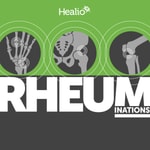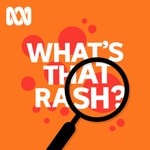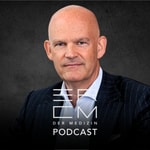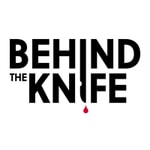The Words Matter Podcast with Oliver Thomson – Details, episodes & analysis
Podcast details
Technical and general information from the podcast's RSS feed.
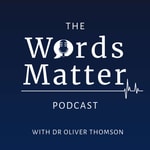
The Words Matter Podcast with Oliver Thomson
Oliver Thomson
Frequency: 1 episode/13d. Total Eps: 76

Recent rankings
Latest chart positions across Apple Podcasts and Spotify rankings.
Apple Podcasts
🇬🇧 Great Britain - medicine
28/04/2025#47🇬🇧 Great Britain - medicine
15/03/2025#88🇬🇧 Great Britain - medicine
02/02/2025#97🇬🇧 Great Britain - medicine
30/01/2025#85🇫🇷 France - medicine
19/01/2025#72🇫🇷 France - medicine
18/01/2025#25🇫🇷 France - medicine
17/01/2025#25🇬🇧 Great Britain - medicine
29/12/2024#98🇬🇧 Great Britain - medicine
20/11/2024#68🇬🇧 Great Britain - medicine
09/11/2024#77
Spotify
No recent rankings available
Shared links between episodes and podcasts
Links found in episode descriptions and other podcasts that share them.
See allRSS feed quality and score
Technical evaluation of the podcast's RSS feed quality and structure.
See allScore global : 58%
Publication history
Monthly episode publishing history over the past years.
Ask Me Anything #6
Episode 76
jeudi 17 novembre 2022 • Duration 40:13
Welcome to another episode of The Words Matters Podcast.
Many of you may be familiar with a recent paper I was proud to co-author titled: Avoiding nocebo and other undesirable effects in chiropractic, osteopathy and physiotherapy: An invitation to reflect – Journal of MSK Science and Practice.
We are very keen to engage the readership in this topic and are inviting readers and listeners of the podcast to critically reflect on the paper and submit questions and comments for a future podcast discussion. Your comments, questions can be submitted via the link here.
On this Ask Me Anything I give my thoughts on the following questions:
- How to teach BPS model & clinical reasoning in academic settings?
- Should MSK practitioners do a degree in psychology?
- How do you organise your evaluation & treatment within/between sessions?
- What do you wish knew when you started/you best advice to students?
- What are the best and worst papers you've read? (spoiler here and here are two of my favourites)
- Do you crack people’s necks?
- How do you balance views as a constructionist/relativist stance with objectively implausible claims?
- What are your thoughts on reassurance and the recent discussion on Twitter? (here)
Support the podcast and contribute via Patreon here
If you liked the podcast, you'll love The Words Matter online course and mentoring to develop your clinical expertise - ideal for all MSK therapists.
Follow Words Matter on:
Instagram @Wordsmatter_education @TheWordsMatterPodcast
Twitter @WordsClinical
Facebook Words Matter - Improving Clinical Communication
★ Support this podcast on Patreon ★
The Outsiders - Clinicians divorced from their profession with Eliud Sierra
Episode 75
jeudi 20 octobre 2022 • Duration 59:57
Welcome to another episode of The Words Matter Podcast.
Apologies for the slight delay in the episode, work and life events continue to get in the way of my passion for producing these conversations.
So it’s time for another Outsider episode (see prior Outsider episodes here, here, here and here), where I talk with clinicians that feel divorced from their profession and don’t identify with their professional label and the professionally assumed meaning of that label.
And on this episode I’m speaking with Eliud Sierra. Eliud is an evidence-based chiropractor who specialises in physical rehabilitation and chronic pain management through strength and conditioning focused treatments. Many of you may be familiar with him via Instagram, with his handle The_Rehab_Chiro – which amongst sharing evidence informed messaging also provides his critical and often humorous thoughts on chiropractic.
Eliud works in the U.S. within in a private clinic located in the city of Chicago . As an undergraduate student, Eliud attended the University of Iowa where we worked in the physical therapy department of the medical college, aiding in research regarding spinal cord injury patients.
After the University of Iowa, Eliud went on to attend Palmer College of Chiropractic where he got his doctor of chiropractic degree and founded the school’s first evidence-based club. In his professional career, Eliud has worked with a wide array of individuals ranging from elite athletes to post-surgical patients.
So it was great to speak with Eliud, as you will hear we share a common experience of leaving via choice or through force a Facebook group of our respective professions and it fun to exchange the reasons and context around that.
Support the podcast and contribute via Patreon here
If you liked the podcast, you'll love The Words Matter online course and mentoring to develop your clinical expertise - ideal for all MSK therapists.
Follow Words Matter on:
Instagram @Wordsmatter_education @TheWordsMatterPodcast
Twitter @WordsClinical
Facebook Words Matter - Improving Clinical Communication
★ Support this podcast on Patreon ★The Clinical Reasoning Series - Narrative ways of hearing and knowing with Sanja Maretic
Episode 66
jeudi 21 avril 2022 • Duration 58:16
Welcome to another episode of The Words Matter Podcast.
In this episode of the clinical reasoning series, I’m speaking with Sanja Maretic. Sanja is an osteopath who works in a non-traditional osteopathic role as a pain clinician in the pain management service.
Sanja has a background in humanities and passion for the intersection between healthcare and humanities and as such she published a qualitative study titled “Understanding patients' narratives” A qualitative study of osteopathic educators’ opinions about using Medical Humanities in undergraduate education (see paper here). And Sanja wrote a truly captivating review for the CauseHealth book which I have linked here.
So on this episode we speak about,
- Narrative-based approaches and the role and function of narratives in the care of people.
- Structural competency (see paper here by Metzl and Hansen) as a framework to appreciate the complex social contexts and structures which guide people health, illness and recovery (see paper on narrative humility here by DasGupta).
- How hearing our patients’ narratives enables us to know and see them, the social structures surrounding their lives and environment
- How narrative analysis can be used to think critically about our practice and the narratives which surround our clinical realities.
- How incorporating the arts, poetry and humanities into healthcare education will help widen the therapeutic gaze of clinicians beyond the mere biomedical.
- Sanja’s experience of journeying and finding her way into a multidisciplinary pain setting.
- The notion of ‘listening hands’ in relation to touch and palpation in manual therapy and how this may or may not facilitate the construction and understanding of a person’s narrative and life-world.
This was such a wonderful conversation; Sanja speaks truly as a clinician in the way she passionately describes her work and her endeavour to better understand and the lives of those people she cares for.
Find Sanja on Twitter @MareticSanja and Instagram @MareticSanja
Support the podcast and contribute via Patreon here
If you liked the podcast, you'll love The Words Matter online course and mentoring to develop your clinical expertise - ideal for all MSK therapists.
Follow Words Matter on:
Instagram @Wordsmatter_education @TheWordsMatterPodcast
Twitter @WordsClinical
Facebook Words Matter - Improving Clinical Communication
★ Support this podcast on Patreon ★The Clinical Reasoning Series - Making the familiar strange - Epistemic reflexivity with Dr Euson Yeung
Episode 65
jeudi 7 avril 2022 • Duration 42:01
Welcome to another episode of The Words Matter Podcast.
A quick note to thank all of you that support the podcast via Patreon, your contributions make a big difference (contribute here).
We’re about halfway through the clinical reasoning series and today I’m speaking with Dr Euson Yeung. Euson is a physiotherapist and an Assistant Professor in the department of Physical Therapy University of Toronto.
His primary area of teaching and research interest is in orthopaedic manual therapy as well as the assessment and facilitation of clinical reasoning among health professional learners. Euson completed his Masters in Education at the University of Toronto (Adult Education) and his PhD with the Rehabilitation Sciences Institute at the University of Toronto.
In this episode we hover around a research paper he published year titled ‘Making Strange’: Exploring the Development of Students’ Capacity in Epistemic Reflexivity published in the Journal of Humanities in Rehabilitation
So on this episode we speak about:
- How the process of reflexivity and in particular epistemic reflexivity calls us to question, or to ‘make strange’ the taken-for granted ways in which we practice.
- We talk about the organizational and social structures which surround healthcare interactions, and the embedded assumptions within our practice.
- We talk about how reconceptualising practice also entails Imagining other ways of how our practice could be.
- We talk about the challenges of becoming more enraging in reflexivity.
- And we discuss ways that clinicians can better support the more reflexive aspect of their practice and thinking.
So I really enjoyed talking with Euson; the work he is doing within physical therapy education is fundamental.
Support the podcast and contribute via Patreon here
If you liked the podcast, you'll love The Words Matter online course and mentoring to develop your clinical expertise - ideal for all MSK therapists.
Follow Words Matter on:
Instagram @Wordsmatter_education @TheWordsMatterPodcast
Twitter @WordsClinical
Facebook Words Matter - Improving Clinical Communication
★ Support this podcast on Patreon ★The Clinical Reasoning Series - A label too far: Overdiagnosis and medicalisation with Prof. Bjørn Hofmann
Episode 64
jeudi 24 mars 2022 • Duration 46:23
Welcome to another episode of The Words Matter Podcast.
A quick note to thank all of you that support the podcast via Patreon, your contributions make a big difference (contribute here).
So we are into episode four of the clinical reasoning series, and I continue my conversation with philosopher of medicine Prof. Bjørn Hofmann where we develop our discussion which started on the ethical implications of disease in the previous episode to now moves on to overdiagnosis and medicalisation.
And for reference we speak around Bjørn’s 2016 paper titled "Medicalization and overdiagnosis: different but alike." Published in the journal Medicine, Health Care and Philosophy (see paper here and see Bjørn’s other work on the topic here)
In this episode we speak about:
- Distinguishing between the concepts of medicalisation and overdiagnosis and discuss their main drivers.
- How medicine, health care, and health professionals have become ever more diligent in defining, detecting, preventing, and treating disease – covering more ground than ever and how this can lead to the adverse situation of overdiagnosis.
- The positive and adverse effects of giving someone diagnosis
- What Bjørn terms the ‘asymmetry of aversion’ meaning that for many health professionals is worse to overlook something than to over do something which may facilitate over diagnosis.
- The role of AI and machine learning to address the crudeness and imprecision in some our diagnostic labelling and processes.
- High and low-value care and the role of healthcare economics on how readily we dip into the diagnostic toolkit and medical testing.
- How the expansion in the concept of disease (and diagnosis) has lead to over diagnosis and medicalization
- And finally we discuss what can we do to reduce the detrimental expansion of disease and subsequent over diagnosis.
So this was another wonderful conversation with Bjørn. He is able to transfer incredibly thought provoking yet fundamental questions to clinical practice and our care of people, and I have immensely grateful to him for giving up so much of his time.
★ Support this podcast on Patreon ★
The Clinical Reasoning Series - Why should we help people who are ill? The ethics of disease with Prof. Bjørn Hofmann
Episode 63
jeudi 10 mars 2022 • Duration 50:18
Welcome to another episode of The Words Matter Podcast.
We continue the clinical reasoning series, and I hope you enjoyed the first two episodes with Roger Kerry and Mark Jones where we covered how we can think about our practice, evidence and our patients.
However, given that the series is exploring clinicians’ reasoning around people with disease, it would seem prudent to consider what disease is both as a concept and phenomena but also the ethical and moral issues tied to and emanating from it and which motivate us to begin to reason about it.
As such, I’m speaking again to Prof. Bjørn Hofmann. I spoke with Bjørn in November last year – on Episode 55: about Dediagnosing- with his co-author Dr Marianne Lea.
Today we speak about his work on bioethics and talk around and about a recent paper of his titled 'Acknowledging and addressing the many ethical aspects of disease'. This is a two-part episode where the second part of the conversation focuses on his work on overdiagnosis and follows nicely from this episode.
Bjørn is a scholar in philosophy of medicine and bioethics with a special interest in the relationship between epistemology and ethics.
He is affiliated with the Department of Health Science at the Norwegian University of Science and Technology (NTNU) and the Centre for Medical Ethics at the University of Oslo. Bjørn's main fields of interests include the basic concepts for health care including disease, causality, (over)diagnosis, medicalization and severity.
In this episode we speak about:
- What we mean when we say ‘disease’?
- Disease as both a concept and phenomena and how the concept of disease provides us with knowledge and guides our actions.
- Disease from a biological perspective, the experience of disease which we term called illness, and the societal perspective we call sickness.
- How these perspectives interact and how they might at times be in conflict with each other.
- We consider disease an an experienced phenomenon with a scientific description and a moral imperative
- We discuss the the moral functions, and why are they of great importance to patients and us as health professionals?
- And finally we touch on how the science and the ethics of disease relate.
Support the podcast and contribute via Patreon here
If you liked the podcast, you'll love The Words Matter online course and mentoring to develop your clinical expertise - ideal for all MSK therapists.
Follow Words Matter on:
Instagram @Wordsmatter_education @TheWordsMatterPodcast
Twitter @WordsClinical
Facebook Words Matter - Improving Clinical Communication
★ Support this podcast on Patreon ★The Clinical Reasoning Series - Diagnostic reasoning and beyond with Mark Jones
Episode 62
mercredi 23 février 2022 • Duration 01:10:06
Welcome to another episode of The Words Matter Podcast.
So we continue on the clinical reasoning series, and on this episode I’m speaking with Mark Jones. And if you haven’t already listened to the previous episode in the series “Do clinicians think link scientists” with Roger Kerry, I suggest you take a listen as my conversation with Mark builds nicely from there.
Mark is an Adjunct Senior Lecturer in the University of South Australia with 35 years’ experience teaching undergraduate and postgraduate physiotherapy.
He has a special interest in biopsychosocial health care and the teaching and assessment of clinical reasoning in physiotherapy. Mark has conducted and supervised research in the areas of clinical reasoning and musculoskeletal physiotherapy with over 90 publications including three editions of the text “Clinical Reasoning in the Health Professions” and the text “Clinical Reasoning for Manual Therapists”. His latest text “Clinical Reasoning in Musculoskeletal Practice” was published in 2019.
And he has been on one of the major contributors to the development of clinical reasoning theory within MSK healthcare in the last 30 years, and we discuss some of his key work, including the seminal work with the late Louis Gifford and Ian Edwards (see Ian's work on clinical reasoning here here and here).
So on this episode we talk about:
- The development of clinical reasoning theory beyond mere diagnostic reasoning.
- Different aspects or strategies of clinical reasoning such as procedural, predictive and collaborative reasoning.
- The pursuit of a structural or pathological diagnosis.
- Mark's own clinical reasoning framework involving hypothesis categories.
- Clinical reasoning within a biopsychosocial framework.
- Diagnostic reasoning approaches such as hypothetico-deductive reasoning and pattern recognition.
- Clinical reasoning in novice compared to expert clinicians.
- And finally we discuss the role of metacognition to mitigating errors in reasoning.
So it was truly and honour speaking with Mark. The label ‘pioneer’ is probably over used, but in Mark’s case it captures his status perfectly. His work on clinical reasoning theory was one of the cornerstones of my own doctoral work into clinical reasoning (see here here and here) and helped make explicit the processes behind my thinking and doing in my clinical practice – which up until engaging with Mark’s work were completely unbeknownst to me.
His knowledge of the field is incredibly extensive as is his ability to communicate and make this information accessible to clinicians and students.
Support the podcast and contribute via Patreon here
If you liked the podcast, you'll love The Words Matter online course and mentoring to develop your clinical expertise - ideal for all MSK therapists.
Follow Words Matter on:
Instagram @Wordsmatter_education @TheWordsMatterPodcast
Twitter @WordsClinical
Facebook Words Matter - Improving Clinical Communication
★ Support this podcast on Patreon ★The Clinical Reasoning Series - Do clinicians think like scientists? With Dr Roger Kerry
Episode 61
jeudi 10 février 2022 • Duration 52:25
Welcome to another episode of The Words Matter Podcast.
Thanks to all of you that support the podcast via Patreon, it means so much and really helps the podcast grow. If you’d like to support the podcast for as little as a pound or a couple of dollars per episode (here).
I’m taking a break from the Outsider episodes to explore the area of clinical reasoning, and to kick off the series I’m speaking with Dr Roger Kerry, whom I chatted with on the podcast last year in episode 35 where we discussed causation in relation to evidence based practice (EBP) as part of the CauseHealth Series.
Roger is an Associate Professor in the Division of Physiotherapy and Rehabilitation Sciences, Faculty of Medicine and Health Sciences, University of Nottingham. He specialises on risks and adverse events of manual therapy, neck pain and headache as well as clinical reasoning (see his research here). He holds a PhD in Philosophy with the doctoral dissertation Causation and Evidence-Based Medicine (see here).
So on this episode we talk about:
- How EBP offers a backdrop to our clinical reasoning. The framework is now omnipresent across healthcare and Roger talks about how it should or could shape clinicians’ thinking, reasoning and interaction with patients.
- Some of the main developments, issues and questions resolved and those un-resolved around EBP.
- What it means to clinically reasoning within a EBP.
- How EBP makes us sensitive to the different sorts (and weighting) of knowledge and evidence and we discuss the implication of this with our clinical reasoning and the potential conflicts.
- Whether clinicians think like scientists and whether clinical reasoning is sciency?
- The similarities and differences between the scientific method and diagnostic reasoning such as data collection, hypotheses formulation, testing and inductive and deductive reasoning.
It’s always an absolute pleasure speaking with Roger; his laid-back style defies the intense consideration he has given to the deep philosophical problems of EBP which while as clinicians we may never fully appreciate (nor necessarily are required to) they help keep us on our toes and be aware and alive to how complex clinical practice is which should motivate us to ensure that our thinking and reasoning remains sharp and purposeful.
Find Roger on Twitter @RogerKerry1
Support the show and contribute via Patreon here
If you liked the podcast, you'll love The Words Matter online course and mentoring to develop your clinical expertise - ideal for all MSK therapists.
Follow Words Matter on:
Instagram @Wordsmatter_education @TheWordsMatterPodcast
Twitter @WordsClinical
Facebook Words Matter - Improving Clinical Communication
★ Support this podcast on Patreon ★
The Outsiders - Clinicians divorced from their profession with Dr Gita Ramdharry
Episode 60
mercredi 26 janvier 2022 • Duration 41:43
Welcome to another episode of The Words Matter Podcast. As usual, thank you to all the support via Patreon – every pledge is hugely appreciated.
So I did say that the previous episode with Rob Jonah would be the last outsider episode for a while, in order to make way for the clinical reasoning series.
However, there’s time for one more and I’m delighted to squeeze this one in before Dr Roger Kerry kicks off the Clinical Reasoning Series where we talk about sciencey thinking in the context of evidence informed clinical reasoning.
So make sure you hit the subscribe button on your podcast player so you don’t miss out on what will be a brilliant collection of conversations.
On this outsider episode, I’m speaking with Dr Gita Ramdharry. Gita is a Consultant Allied Health Professional in Neuromuscular Diseases at the Queen Square Centre for Neuromuscular Diseases UCLH in London. She is an Honorary Associate Professor at UCL and a Visiting Professor at Kingston University.
She has worked as a physiotherapist since 1995 and developed a special interest in neurology early on. Gita completed a PhD in 2008 looking at walking patterns, endurance and orthotic interventions for people with Charcot-Marie-Tooth disease. See more about Gita’s research here.
Last year, Gita wrote a wonderful blog post on her experiences of the interaction and sometimes clash between the physiotherapy professional culture and her own mixed heritage and cultural background. The blog is titled 'Awakening to the impact of culture on how we deliver care and treat our colleagues'.
In her blog Gita talks about the challenges she perceived as student, educator and clinician in feeling like a cultural outsider in relation to physiotherapy. I’ve linked the blog in the show notes and would encourage you to have a read as it’s the perfect accompaniment to our conversation.
This is the first time that I’ve directly focused on culture and ethnicity on the Podcast and Gita provided the ideal opening to these important issues and I’ve taken so much away from listening to her experience and I am sure you will too.
Find Gita on Twitter @gitaramdharry
Support the show and contribute via Patreon here
If you liked the podcast, you'll love The Words Matter online course and mentoring to develop your clinical expertise - ideal for all MSK therapists.
Follow Words Matter on:
Instagram @Wordsmatter_education @TheWordsMatterPodcast
Twitter @WordsClinical
Facebook Words Matter - Improving Clinical Communication
★ Support this podcast on Patreon ★The Outsiders - Clinicians divorced from their profession with Rob Jonah
Episode 59
mercredi 12 janvier 2022 • Duration 45:06
Welcome to another episode of The Words Matter Podcast.
As always, a huge thank you to those of you supporting the podcast via Patreon – you help enable these conversations to become possible. f you’d like to contribute you can visit Patreon.com/thewordsmatterpodcast – every little helps.
So, on this episode I’m continuing with the Outsider Series where I speak with clinicians who feel they’re outsiders of their profession; sharing their experiences, struggles and how things could maybe change.
And this may be the last outsider episode for a while, as I’m pausing the series to commence the much-anticipated clinical reasoning series, with some fantastic guests, so stay tuned, but there are plenty more outsiders planned to share their experiences.
Today I’m speaking with former osteopath Rob Jonah. Rob qualified as an osteopath in the UK a couple of years ago, having changing from his previous career as a plumber. He talks about his experience as a student and initial period in professional practice; a combination of which lead him to leave the osteopathy profession and return to his plumbing career.
Rob’s experience of being an osteopath is just that, his experience. And as you will hear it’s a largely negative one. However, I believe that by hearing his experience of how he entered the osteopathy profession and then abruptly left those of us in clinical education and leadership may learn how we can better develop new osteopaths who are on the edge of professional life and support new clinicians post-qualification.
I know Rob personally, and he’s not some disgruntled and bitter new grad that couldn’t hack it as an osteopath. It was clear to me that he wanted to make it work, he gave it his all and that leaving the profession was a difficult and undesired last resort. I hope and I think you will come to the same view after listening.
If you want to have more context into Rob’s decision to leave the osteopathic profession, you can check out the place where he announced his decision on his Instagram profile @How2Move.
Needless to say, it sounds like Rob’s in a much better place now and I wish him the best in his return to his previous career (see here).
Support the show and contribute via Patreon here
If you liked the podcast, you'll love The Words Matter online course and mentoring to develop your clinical expertise - ideal for all MSK therapists.
Follow Words Matter on:
Instagram @Wordsmatter_education @TheWordsMatterPodcast
Twitter @WordsClinical
Facebook Words Matter - Improving Clinical Communication
★ Support this podcast on Patreon ★





